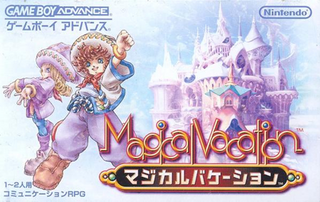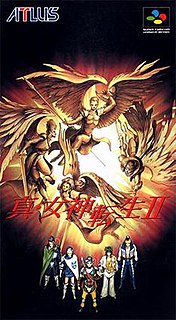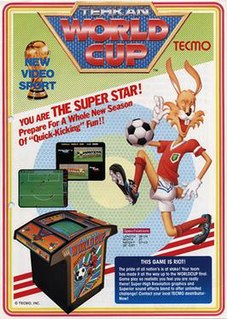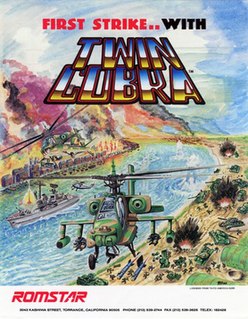 W
WArkanoid is a 1986 block breaker arcade game developed and published by Taito. In North America, it was published by Romstar. Controlling a paddle-like craft known as the Vaus, the player is tasked with clearing a formation of colorful blocks by deflecting a ball towards it without letting the ball leave the playfield. Some blocks contain power-ups that have various effects, such as increasing the length of the Vaus, creating several additional balls, or turning the Vaus into a laser cannon.
 W
WBio-Senshi Dan: Increaser to no Tatakai is a 1987 action-adventure game that was released exclusive in Japan for the Family Computer.
 W
WBlaZeon: The Bio-Cyborg Challenge is a horizontally scrolling shoot 'em up arcade game released by Atlus in 1992 and was ported to the Super Nintendo Entertainment System in the same year. The game's most distinguishable feature is that players come equipped with a device that allows them to freeze and control certain robots.
 W
WThe Caligula Effect is a role-playing video game developed by Aquria. It was released for the PlayStation Vita in Japan in June 2016, and by Atlus USA in North America and Europe in May 2017. A remake of the game, The Caligula Effect: Overdose, was released for the PlayStation 4 in Japan in May 2018, and worldwide by NIS America in March 2019 for the PlayStation 4, Nintendo Switch, and Microsoft Windows. An anime adaptation of the same name premiered in April 2018.
 W
WCosmo Tank is a video game published by Asuka Technologies and developed by Atlus. It was released in 1990 for the Game Boy; with most of the gameplay programmed as a 2D shooter with some levels resembling that of a 3D shooter video game.
 W
WDevil Summoner: Soul Hackers is a role-playing video game developed by Atlus. Forming part of the Megami Tensei series, Soul Hackers is the second game in the Devil Summoner subseries. Originally published by Atlus for the Sega Saturn in 1997, it was later ported to the PlayStation in 1999, and Nintendo 3DS in 2012.
 W
WDigital Devil Story: Megami Tensei refers to two distinct role-playing video games based on a trilogy of science fantasy novels by Japanese author Aya Nishitani. One version was developed by Atlus and published by Namco in 1987 for the Famicom—Atlus would go on to create further games in the Megami Tensei franchise. A separate version for personal computers was co-developed by Atlus and Telenet Japan and published by Telenet Japan during the same year. An enhanced port for the Super Famicom by Opera House was released in 1995.
 W
WDigital Devil Story: Megami Tensei II is a role-playing video game developed by Atlus and published by Namco for the Famicom. An enhanced Super Famicom port was developed by Opera House and released by Atlus in 1995. The second entry in the Megami Tensei series, the gameplay features the unnamed protagonist exploring a post-apocalyptic wasteland, battling and recruiting demons as they are pushed into taking part in a conflict between the demonic forces of Lucifer and the army of the One True God.
 W
WDungeon Explorer is an action role-playing video game developed by Atlus and originally published by Hudson Soft for the TurboGrafx-16 in Japan on March 4, 1989 and later in North America by NEC on November 15 of the same year. The first installment in the eponymous franchise, the game is set in the land of Oddesia overrun by an alien race, where players assume the role of one of the eight main characters tasked with recovering the Ora stone to kill the alien king Natas. Co-directed by Kazutoshi Ueda and Yōsuke Niino, the title was created by most of the same team that would work on several projects such as later entries in the Megami Tensei series. Though it was initially launched for the TurboGrafx-16, it was later re-released through download services for various consoles.
 W
WThe Karate Kid is a video game published by LJN and developed by the Japanese company Atlus Co., Ltd for the NES. The gameplay loosely follows plot elements from the first and second Karate Kid films. Later that year, a fighting game was released on the Amiga and Atari ST by Microdeal.
 W
WKwirk, known in Japan as Puzzle Boy , is a puzzle video game developed and published by Atlus in Japan on November 24, 1989 for the Game Boy. The game was later published in North America in March 1990 by Acclaim Entertainment. On February 22, 1991, Atlus ported and released Puzzle Boy to the PC Engine/TurboGrafx-16 in Japan.
 W
WMagical Starsign, originally released in Japan as Magical Vacation: Itsutsu no Hoshi ga Narabu Toki , is a role-playing video game for the Nintendo DS developed by Brownie Brown. It is the sequel to the Japan-exclusive Game Boy Advance title, Magical Vacation. Magical Starsign is the second game in the Magical Starsign series and was released in Japan and the United States in 2006 and was released in Europe the next year. Nintendo Australia has said that it would not publish the game in the Oceanic region as it expected low sales of the game.
 W
WMagical Vacation is a 2001 role-playing video game developed by Brownie Brown and published by Nintendo for the Game Boy Advance only in Japan on December 7, 2001, and was later re-released in the same region in 2006. Japanese singer, model, and actress Mika Nakashima was featured in the television commercials for Magical Vacation.
 W
WMajor League Baseball is a sports video game released in 1988 for the Nintendo Entertainment System. It is notable for being one of the first video games licensed by Major League Baseball, although it was not endorsed by the Major League Baseball Players Association. Without the backing of the Players Association, the game could not name the actual players, although it was able to use their numbers, thus accurately portraying the contemporary teams and their rosters. In doing so, it became the first baseball game for the Nintendo Entertainment System to carry official Major League Baseball licensing and lineups.
 W
WMighty Bomb Jack is a 1986 Nintendo Entertainment System (NES) game released by Tecmo, which was later ported to the Amiga, Atari ST and Commodore 64. Within PAL-A regions, the NES version was only released in Australia. The NES version was released on the Virtual Console on May 7, 2007 for the Wii, on December 6, 2012 for the Nintendo 3DS and on January 23, 2014 for the Wii U. It is also available to play on Nintendo Switch Online as of November 14, 2018, while an updated High Game Deviation Value! version was released on July 17, 2019. Mighty Bomb Jack is a sequel to the 1984 game Bomb Jack.
 W
WMonster Kingdom: Jewel Summoner is a turn-based role-playing video game developed by Gaia and published by Sony Computer Entertainment and Atlus for the PlayStation Portable console. The game was released in February 2006 in Japan and in February 2007 in North America.
 W
WRockin' Kats is a platform video game produced by Atlus Software Inc. in 1991 for the Nintendo Entertainment System. The side-scrolling game involves the adventures of a cartoon cat in his quest to defeat a criminal gang of dogs that has taken over the city.
 W
WShin Megami Tensei is a post-apocalyptic role-playing video game developed and published by Atlus. Originally released for the Super Famicom in 1992 in Japan, it has been ported to multiple systems and eventually released in the West for iOS in 2014. It is the third game in the Megami Tensei series and the first in the central Shin Megami Tensei series. The gameplay uses first-person navigation of dungeons and turn-based battles against demons. The player can recruit demons as allies by talking to them rather than fighting them, and two to three demons can be fused to create new demons.
 W
WShin Megami Tensei II is a post-apocalyptic role-playing video game developed and published by Atlus. It was originally released for the Super Famicom in 1994 in Japan, and has since been ported to multiple platforms. It is the second game in the Shin Megami Tensei series, which is a subset of the larger Megami Tensei franchise.
 W
WShin Megami Tensei: Devil Summoner is a role-playing video game developed and published by Atlus. Forming part of the Megami Tensei series, it is the first title in the Devil Summoner subseries. It was first released for the Sega Saturn in December 1995, and received a port to the PlayStation Portable in December 2005. Despite reports of it being planned for localization, neither version has been released outside Japan.
 W
WShin Megami Tensei If... is a Japanese role-playing video game developed and published by Atlus in 1994 for the Super Famicom. It is a spin-off from the Shin Megami Tensei series, itself part of the larger Megami Tensei franchise. Since release, it has been ported to mobile devices, the PlayStation and Microsoft Windows, and re-released digitally through Nintendo's Virtual Console service. The story follows a student of Karukozaka High School after their school is sucked into the realm of demons by a vengeful student's demon summoning spell going wrong.
 W
WTehkan World Cup is a multi-player soccer game featuring a trackball controller. Programmed by Michishito Ishizuka it was released to arcades in 1985 by Tehkan, Ltd., the former name of Tecmo, Inc. Its arrival coincided with the buildup to the 1986 FIFA World Cup. It featured the then colors of several of the world's top teams such as West Germany, Argentina and Brazil, although it did not mention any team by name. It was most commonly released in a cocktail cabinet form factor, while graphically it offered a two-dimensional birds-eye view of the field that was unique for its time. Its trackball control system contributed significantly to its gameplay which was relatively speedy and exhibited a fluidity something akin to ice hockey, with as little as 3 seconds required to score from kick-off. Two-player action could be highly competitive, with players facing each other across the game space while using sweeping arm movements reminiscent of table tennis.
 W
WTown & Country Surf Designs: Wood & Water Rage is a skateboarding and surfing game published by LJN for the Nintendo Entertainment System in February 1988. The game shares its name with the world famous surfboard manufacturer, Town & Country Surf Designs, and features the company's mascot characters, known as "Da Boys".
 W
WTwin Cobra is a 1987 vertically scrolling shooter arcade video game originally developed by Toaplan and published by Taito in Japan and Europe, then in North America by Romstar. It is a sequel to Tiger-Heli, which was released earlier on arcades in 1985 and later ported to other platforms. Controlling the titular attack helicopter, the players must fight endless waves of military vehicles while avoiding collision with their projectiles and other obstacles. It was the fourth shoot 'em up game from Toaplan, and their tenth video game overall. Although first launched in arcades, it was later ported across multiple platforms, each one being created by different third-party developers and featuring several changes or additions compared with the original version.